Charles Pakana (Victorian Aboriginal News):
According to some records of the more than 250 Aboriginal languages that existed at the time of colonization, less than half that number are spoken today. There is change afoot though, and there are people right across this country and in Victoria who are doing their utmost to breathe life back into languages that were banned and even outlawed. And today we’re speaking to one of those people specific to the Woi Wurrung language, someone who’s been at the very forefront of resurrecting the Woi Wurrung language, Brooke Wandin. Brooke, thanks for joining me on the podcast today.
Brooke Wandin:
Absolute pleasure.
Charles:
Brooke, let’s dive straight into it. The historical perspective on language use being banned. Now we’re sitting here today in Coranderrk, so that’s a very deep and meaningful place because language was banned here, wasn’t it?
Brooke:
Yeah. So what’s interesting, I think about Victoria and we all forget, is that colonization hit us early as opposed to other states. So the language that remained by the time that Coranderrk was established would’ve already been minimal. But there are some oral histories in mobs connected to Coranderrk, and even in my own, that some of the old people, like my grandmother would speak language here at Coranderrk.
And I just think that’s precious, fabulous, and frankly surprising that some language did remain. If you have disconnection from your language and you do not get to learn it in utero when you’re born, well, how on earth could you retain it?
Charles:
So what was it like here to the best of your knowledge when it was a mission? So up until what, 1924, I believe? Was it outlawed? Was it simply not permitted? Were people punished if they were heard practicing language?
Brooke:
So as far as I’m aware, I suppose the forming of Coranderrk de was about compromise. It was holy swear words. Our people are dying. We have no children left. There was a real sense of dread for the future of Wurundjeri people and Kulin people. And so this kind of idea of what can we do to survive? Okay, let’s farm like white people. Let’s adopt those Christianity ways, those other ways to survive. The thing that was interesting about here is they did it so bloody well.
Charles:
They did indeed. And there was a great deal of jealousy, which contributed to the downfall of this place, which is quite tragic. But when it comes to language, was there, to your knowledge, much language spoken here, even clandestinely?
Brooke:
Perhaps if I’ll go backwards. I have a beautiful example of the remembering of language. In the 1960s, an absolutely fabulous woman by the name of Luisa Hercus. She recorded a variety of Victorian Aboriginal languages. She interviewed my Uncle Frank and three others. And these are my grandfather’s siblings. This is in the 1960s. So they’re elderly people, frail people. The four of them together remembered 100 Woi Wurrung words between them.
So let’s go back to mission time, Coranderrk. They would’ve been here, they were born in the 1880s. What blows my mind is they would’ve seen and known Barrack, they would’ve been aware of all of the different protests that happened here, the walking into Melbourne, sticking it right up the government saying, “Don’t treat us this way,” type thing. And they struggled to remember those words as elderly people. And when you hear the audio, it’s beautiful.
It’s challenging because you’re like, “Oh my God.” These old people are trying desperately to remember these words. They can’t remember these. They can remember that. But what was apparent to me was how wonderful, how resilient, how brave our people were and are to clinging on to those precious words. And I feel such a sense of connection through say Uncle Frank, and he’s just one that connects me like a rocket ship back to those ancient times, like a vortex, like a, I don’t know what the other words are, but there’s this…
Charles:
Sure.
Brooke:
I’ve got this visual of me flying through time, 2024 smack bang to a time when my people would speak to each other in their mother tongue with purpose and meaning. Like, how deadly is that? Stop myself swearing then.
Charles:
Very restrained of you. What implication do you think this loss of language had on connection to culture? Because so much is intertwined, isn’t it? So much that you refer to in culture has a direct linguistic link. So the loss of that language from a cultural perspective meant what?
Brooke:
Oh, it’s huge. I think it’s immeasurable. And I also think as a person born in the 1970s, how can I grapple with that properly? I probably can’t. But my thinking around that is it dissolves so much. I think the thing for me that’s probably diminished is perhaps things like kinship systems, rules around who you can and can’t talk to. So those respectful behavior protocols that we would’ve had.
And the other thing I’ve been thinking about is traveling country. And that’s something that I’ve been really thinking about and becoming slightly obsessed with is country, the names of country and the names of country that have persisted through all of these years. I think those sorts of things have diminished. So yes, connection to place, connection to country and behavior around your own behavior in terms of your responsibility to others in your mob.
Charles:
Explain that for me a little bit as it relates to language?
Brooke:
Well, I think, for example, we have some words that men wouldn’t have known. Men wouldn’t have known certain words because it was for the women to be in charge of that and vice versa.
Charles:
Right.
Brooke:
And I think these are the things that are really interesting because what happens if you’re a Victorian blackfella and you meet someone who’s uneducated, they assume that you know all these things because there are people in Australia who still have those connections. It doesn’t make me more or less Aboriginal.
Charles:
Of course.
Brooke:
And I deliberately say that with sarcasm because people have said those things to my face, but it highlights the power in language and ceremony. And I think I’m completely obsessed with the not knowing.
Charles:
When did this obsession start? You and a couple of others, Auntie Mandy Nicholson, of course, have been at the very forefront of trying to breathe life back into Woi Wurrung. Now, just before we pursue with that, you mentioned Woi Wurrung before, which is the correct or is it an optional?
Brooke:
Oh, love it. So a pronunciation question?
Charles:
Yes.
Brooke:
Oh, here.
Charles:
Here we go.
Brooke:
How long have you got? Okay, let’s do it this way. Visualize a seven-year-old child right now, choose one in your mind. I’ve got my grandchild.
Charles:
Yep.
Brooke:
Think of a 15-year-old teenager who doesn’t care about anything at the moment. Think about a spritely young 66-year-old man. I don’t know. Hint, hint, thinking of you, unc.
Charles:
Yeah. Thanks so much indeed, Brooke.
Brooke:
You know what I mean?
Charles:
Yep.
Brooke:
And think about an elderly person that has some teeth missing. If they all say the one word, it’s going to sound different.
Charles:
Gotcha.
Brooke:
So I am a perfectionist in my life and I have to let go of pronunciation being perfect. And that’s really hard. For me, I probably have said Woi Wurrung differently a hundred times and that’s okay. Because you know what’s important? Is that I bloody say it.
Charles:
Absolutely. Absolutely. So let’s get back to it then, and we’re just going to Woi Wurrung and make it easy for this 66-year-old bloke.
Brooke:
Yay.
Charles:
If that’s okay.
Brooke:
Whoo.
Charles:
Is when did this passion start for you?
Brooke:
Oh, yeah.
Charles:
When did you start that journey to breathe life back into the language?
Brooke:
What’s been happening to me is I’ve been saying everything’s happened by fluke, but that can also mean I’ve been put in the right place at the right time. Right?
Charles:
For sure.
Brooke:
So I used to work at the local health org here in Healesville, and my contract was up, and I remember being really upset. I remember going, “Oh.” Because I loved that job. I loved working with the kids in this community. Anyhow, by fluke, there was a job to teach LOTE at Melton West Primary School.
Charles:
Now LOTE being L-O-T-E?
Brooke:
Yes. Languages other than English.
Charles:
Right.
Brooke:
So off I go. I literally three weeks later, get in my car, drive to Melton West and just start teaching with no training, no idea of what I’m doing. I just pulled together enough words that actually were from a resource that Mandy Nicholson had made, and off I went. I was teaching prep. So it was head, shoulders, knees, and toes. It was, here’s the word for koala, Gurrborra. Color it in, draw me a tree. Ooh, tree. I wonder what the word is in language. Oh, [inaudible 00:08:27]. And that was the lessons. And I just stayed one week ahead.
Charles:
Now, these were non-Aboriginal kids or Aboriginal kids?
Brooke:
There were no Aboriginal children in that class.
Charles:
We will go down that path a little bit later on about teaching language to non-Aboriginal children, because I know that even within the Woi Wurrung there is definitely a difference of opinions at some level.
Brooke:
Of course.
Charles:
We’ll get to that later. So in teaching and staying one week ahead of the students.
Brooke:
Yeah. I did that for about 10 months. That must have been until the end of that year. And I thought, “What am I doing? Why am I driving from Healesville?” So I’m going from one side of Wurundjeri country to the other. I’m teaching 25 kids. It was really good learning, but I knew it was just absolute ridiculous use of my time. Then by fluke, or maybe it’s exactly where I was meant to be, the principal at Healesville Primary School contacted me and said, “We need to do something at our school.” And I went, “Again? All right, I’ll do it.”
Charles:
When was this, by the way?
Brooke:
So this is 2017.
Charles:
Right.
Brooke:
So off I go to Healesville Primary School and just start cultural education. So just broad cultural stuff. So things like reinforcing to the children that, “Oh, do you go to school on Wurundjeri? Oh, you do? Oh, I’m a Wurundjeri person. Aren’t blackfellas awesome?” That sort of lesson.
I still teach there today. It’s one of my favorite jobs because I think it’s actually one of the most critical things that’s important for our entire nation, that young people are exposed to the information that we all weren’t through our education is that blackfellas are awesome. Full stop. That’s the curriculum.
Charles:
No argument here.
Brooke:
So that was lovely. Then an opportunity came up to study again by fluke or whatever it’s meant to be. I saw a pamphlet in at the Wurundjeri council office. I picked it up and I applied. This was the turning point.
Charles:
And what was this for? Studying for what?
Brooke:
Yeah. So it was called Cert III in Learning an Endangered Aboriginal Language. That was 12 months long. It was with about 10 blackfellas from across Victoria from about six different languages taught by an Aboriginal trainer. And that was through the Victorian School of Languages. I could not get enough of that course. It was a pretty huge course, and I remember a lot of the students saying, “This is pretty challenging,” but I couldn’t get enough.
So that came to an end. That was about 12 months worth of study, and it was followed on, thank God, by a Cert IV in Teaching an Endangered Aboriginal Language. Now that was perfect for me because I was studying, but I was also teaching two days a week. So I could do my lesson and then I could plan what I was going to do in the classroom for the next day. So I was learning and then instantly having a crack at it with the kids at school.
Charles:
You were significantly more than a week ahead by this stage, weren’t you, of your students?
Brooke:
Yep. Because I’d had the previous experience.
Charles:
Of course.
Brooke:
Of just being in the classroom. Anyhow, if I could do that study again, I would. Not because I’d be better at it, not because I’d know the content, is because it’s the learning and it’s the sitting with other Aboriginal people and going, “Oh, have you got the word for that? Oh, haven’t you? How come? What’s yours? Oh, oh, is your word for face really similar to mine? Oh.” And you come up with all these glorious moments of realization. That’s what our ancestors would’ve done.
Charles:
So these were all Victorian languages that were being taught here?
Brooke:
Yeah.
Charles:
So how many language groups were there, are there across Victoria, to your knowledge?
Brooke:
I’m going to go with 44. And we always have to remember that the number could be slightly higher due to that absolute tsunami of colonization.
Charles:
Now does that include dialects or is that languages specific?
Brooke:
Good question. And I remember I still to this day have a lot of trouble understanding what dialect is.
Charles:
Sure.
Brooke:
And I think it’s because of those, how do I explain it? Things aren’t clear around language, and language is so fluid. If I think our ancestors could speak all of the languages of their nation. So for example, for me, for my mob, five languages. You think about those other mobs with bigger, more complex clan systems.
Charles:
For sure.
Brooke:
What comes to mind? Gunditjmara.
Charles:
Yep.
Brooke:
Sorry, out there, mob, if I’m saying incorrectly, they have a higher, I’m going to say higher number of clans, number of mobs, number of languages. They would’ve spoken more diverse language. Absolutely incredible that our ancestors were always multilingual, always. And that’s another kind of lure of me to keep learning, is that number one, it’s so good for our brain, it’s so good for our bodies. Country needs to hear language again. I feel like a stronger, more powerful, more clear human knowing language, it’s really been good for my physical and mental health. But also it’s just this, I can’t explain it, it’s just I have to do it.
Charles:
Well, let me ask you this then. You mentioned that back in the 1960s, Louisa, was it Hincus?
Brooke:
Yeah, Louisa Hercus.
Charles:
Louisa Hercus.
Brooke:
Legend.
Charles:
Took down this remembering of language and there were about a hundred words from Woi Wurrung language. What is it now? And then following that, how can we increase from that?
Brooke:
So is the question around the number of words?
Charles:
Well, we’re talking about there were a hundred words recollected during that project.
Brooke:
At that time. Can I go slightly off track to give you the answer?
Charles:
Absolutely.
Brooke:
That’s how I roll. In 2022, I did a fellowship at the state library of Victoria, and I look back and I giggle at myself now. My project was called wurrung baggunga ba yiaga, which means “To gather and find language.” The plan was, I’ll just go to the state library and I’ll just see how much language is there. The answer is a truckload.
Charles:
Oh, really?
Brooke:
Yeah. So for example, let me think of an example. It’s really difficult to put into numbers. The amount of language that was recorded is enormous. So from as soon as white fellows got here, they recorded stuff about us in a whole range of different ways. We know they recorded what we looked like, how we acted, but they recorded a lot of language. There is heaps and heaps of material in heaps and heaps of different places.
That’s the quickest way to describe it. I don’t know the number. But what makes me really happy is it’s there. And what has to happen now is peoples, it can’t just be small numbers of people working on going through all of that material, taking the time to pull together a database to compare it, do the analysis, to collaborate with linguists and to get what we need is a spelling system and a dictionary. I think that’s the next step. And I think as a community, we’re nearly there. And the last thing I want to say is we still have some trouble getting access to some records.
Charles:
Why is that?
Brooke:
I had an experience, I think it was last year, I was a part of a project called [foreign language 00:15:24]. In short, it’s a online platform where you can, for example, scan pages of a historical record. Historical record can be a word list, it can be a word list with a sketch. It can be a lot of different things. And then beside it, you have the transcription. It’s a really good tool.
And we were trying to access a particular set of papers from R.H. Matthews, which was at the National Library of Australia. And we found it incredibly difficult to get access. We were asking for digital access because we didn’t want to have to go to Canberra to sit, number one, travel, get there, do all the rigmarole, blah, blah, blah. We just wanted manuscripts for online and then we could do the transcription ourselves.
Charles:
Are these blockages bureaucratic?
Brooke:
Yes, of course they bloody are.
Charles:
So from where in particular?
Brooke:
So the example is I wrote a letter, I said, “Hi, this is who I am. I’m doing language work. People in my community know I’m doing language work.” And the letter came back saying that my letter was inadequate and it also referred to my gender. So I’m assuming they wanted a male elder to write that letter. And to be really clear and not to be harsh at the moment, the powerful male elders in our community are doing other work and they’re busy, so they can’t do everything. So I’ve got this real sense of I was very disappointed, but I wasn’t surprised.
Charles:
How recent was this?
Brooke:
Last year. Institutions.
Charles:
So that’s in 2023.
Brooke:
Institutions. That’s a whole nother episode maybe, Charles. Well, they have rules. They have rules. I think they’ve become completely risk averse. What might happen if they give the information over to me? Probably nothing. I’ll just look at it, love my language, and that’ll be it.
Charles:
Well, off record, we might have a bit of a chat about that and see what we can do and maybe poke some of the bureaucrats in the behind-
Brooke:
Ooh.
Charles:
… a bit later on. But let’s continue on there. So this massive work that you and others are doing now to breathe life back into Woi Wurrung, what impact do you believe that that’s having right now for the Wurundjeri people?
Brooke:
Ooh, I think language has provided me some opportunities I never thought would happen in my life. I think being a risk-taker, being willing to jump into an opportunity and to see what happens has been really special. I have been involved in exhibitions that have shown language.
Maybe I’ll just give an example of a few projects because I’m really proud of these. The most recent one is at Lightscape at the Royal Botanic Gardens. We projected some language posters onto the national herbarium that showed the historical specimen with the proper language word, the language name. That was delightful. I’ve made a sound work with my cousins, which is actually currently on show at the Van Abbemuseum in Eindhoven, Netherlands.
Charles:
Wow.
Brooke:
Who knows if my language has ever been heard in the Netherlands before. I don’t know. And we did that same sound work at Tarrawarra and I’m creating more sound works into the future.
Charles:
What are your goals?
Brooke:
Well, I think at the moment my goal is to keep turning up here at Coranderrk every Monday at 4:30 for my mob. And if they want to come and learn language, they come. I think that’s my job for now. I can’t do everything obviously as one individual. I think what’s interesting about language is it’s the slow burn. It’s a marathon. And that was hard to accept a couple of years ago. But I think I’ve wrapped my head around that now. I want my family to not be scared of language. I want my family, if they choose to, to come to language and just to hang out. And it’s 95% laughing and 5% language learning.
Charles:
From a cultural perspective, what do you think, not what it does now, but what do you think it could mean for the Wurundjeri people? Because you were saying before that the loss of language brought about that lack of connection to country and to traditional cultural practices. Do you believe that by bringing language back that it can at least go part of the way to retrieving those connections?
Brooke:
Absolutely. I think I’ll answer this short and sweet, which is strange for me.
Charles:
It is.
Brooke:
I know. I think language reclamation, language revitalization, whatever words you want to use, I think are incredibly healing for the individual to get the sounds back into the hearts and the mouths of our people. And I really truly believe that our country needs to hear language again.
Charles:
I know that the number of times I’ve been with Uncle Bill Nicholson and he’s heard language being spoken, and it’s the closest I’ve seen that man to an emotional state that language means so much to him and I know to so many of the others as well.
Let me ask the question that I alluded to earlier on in the interview and that is the cultural mores or the issues. And just for the audience, Brooke is now smiling, knowing full well what’s coming up, but the challenges that exist in teaching Woi Wurrung language to non-Aboriginal people. What are some of the thoughts and concerns when it comes to that?
Brooke:
Well, I think to be clear, I’ve been on my own rollercoaster ride about that. But where I’m at right now, number one, if I don’t practice language every day, I’m going to lose it. I need to practice language every day. I need to take every single opportunity I can to slide in a bit of cheeky language. Number two, I’ve got to keep teaching language to work out what works and doesn’t work.
So I have a ready-made audience at Healesville Primary School. And at the moment there are a very small number of Aboriginal children who go to that school. One of them is my granddaughter. I have to keep looking at myself in the mirror and checking, is this okay? The way that I sort of try to work that out is the questions I ask myself. Does the five-year-old or the 12-year-old at Healesville Primary School know more language than my family currently?
So the cousins that I teach here on a Monday afternoon. And I kind of navigate it that way. So for example, when I go to school, I’ll teach the kids lots of single words. So we have a game that we play, a memory game. I put a card up the front and for two minutes I try not to use any English. And we have a game and it’s hilarious. They love it.
They want to beat. Like last week they had five cards. This week they’ve got seven. They think they’re brilliant. For example, when I come and teach my family language, we’re working out how to say, “How are you?” And my cousins are working out how to say, “I am proud.” So I make sure that I have my own cultural protocols in place, which I have created for myself. I had a moment at [inaudible 00:22:07], there was an amazing follow up there talking about [inaudible 00:22:11]. So they’re considered going great guns in their language reclamation work, right?
Charles:
Right.
Brooke:
He stood up there and he just kind of spat out really beautifully at the end, “You have to get your whole country to love your language. Everyone who lives there. If you think that you can do it by yourself, you’re kidding yourself. You need everyone to be invested.” And I sat back in my chair and I kind of went, “Oh.”
Charles:
Makes a bit of sense.
Brooke:
It makes sense.
Charles:
Yeah.
Brooke:
Because I want language for my mob, right? Of course I do. It’s for them, it’s theirs. They’re in charge of it. They’re the authority of it. But I tell you what, there’s no good paid jobs in teaching blackfella language at the moment. We’ve got to be smart. We’ve got to be strategic. We’ve got to include everyone. Because I also think it’s part of what I alluded to earlier about teaching the kids at Healesville Primary is that blackfellas are awesome and Woi Wurrung language is just as precious as any other language.
Charles:
Is there a resource that people can go to if they want to start exploring this? Obviously they don’t want to come here at four o’clock on Monday afternoon when it’s just your mob and your family. But if someone is interested in at least learning a little bit about then gaining that appreciation from another level about the Wurundjeri people, is there something or will there be something?
Brooke:
So the position from my perspective, where we are right now is we don’t have a lot of resources specifically to teach language. But perhaps because people, I understand the broader community, what can I do? And that’s a fantastic question. I think just keep your eyes and ears open and go to exhibitions. Just keep informing yourself that way.
So for example, if us as a mob, we’re going to present something, go to it. Lean into that stuff. I think that’s probably the best way for now. And I understand that people are interested and keen, but they’ve just got to wait till we’re ready.
We are nearly there and I have to prioritize my mob first and then everyone else next. But just keep educating yourself. Google, just Google Woi Wurrung language. There’ll be little snippets of those awesome language warriors. Maybe even just lean into other languages too, to see what’s out there. And also be careful because it’s really addictive. Go down the rabbit hole like I do.
Charles:
Nothing wrong with that. Brooke Wandin, thank you so much indeed for your time and your perspective.
Brooke:
Good on you, mate. Thanks. Noon Gudgin.


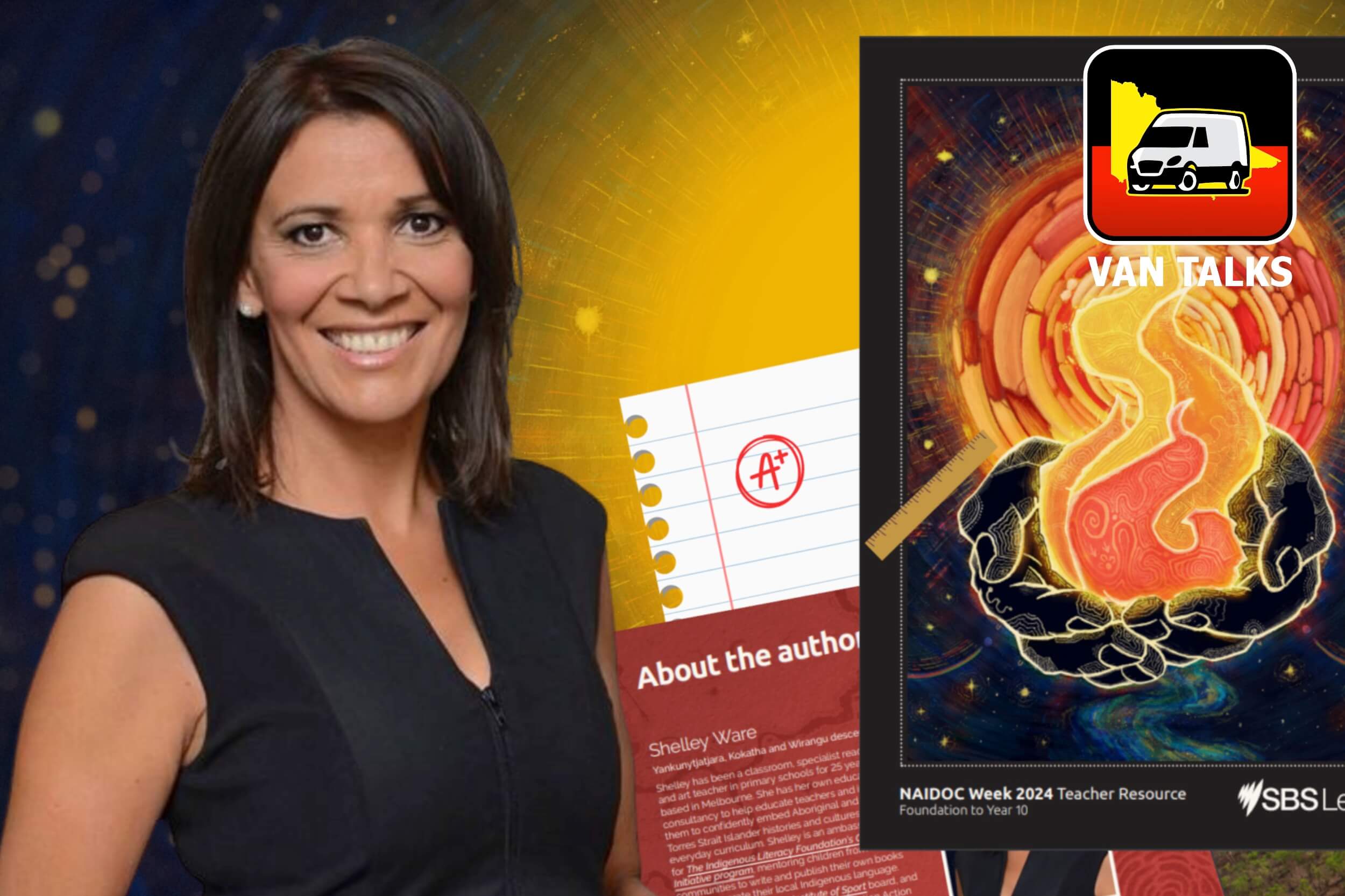
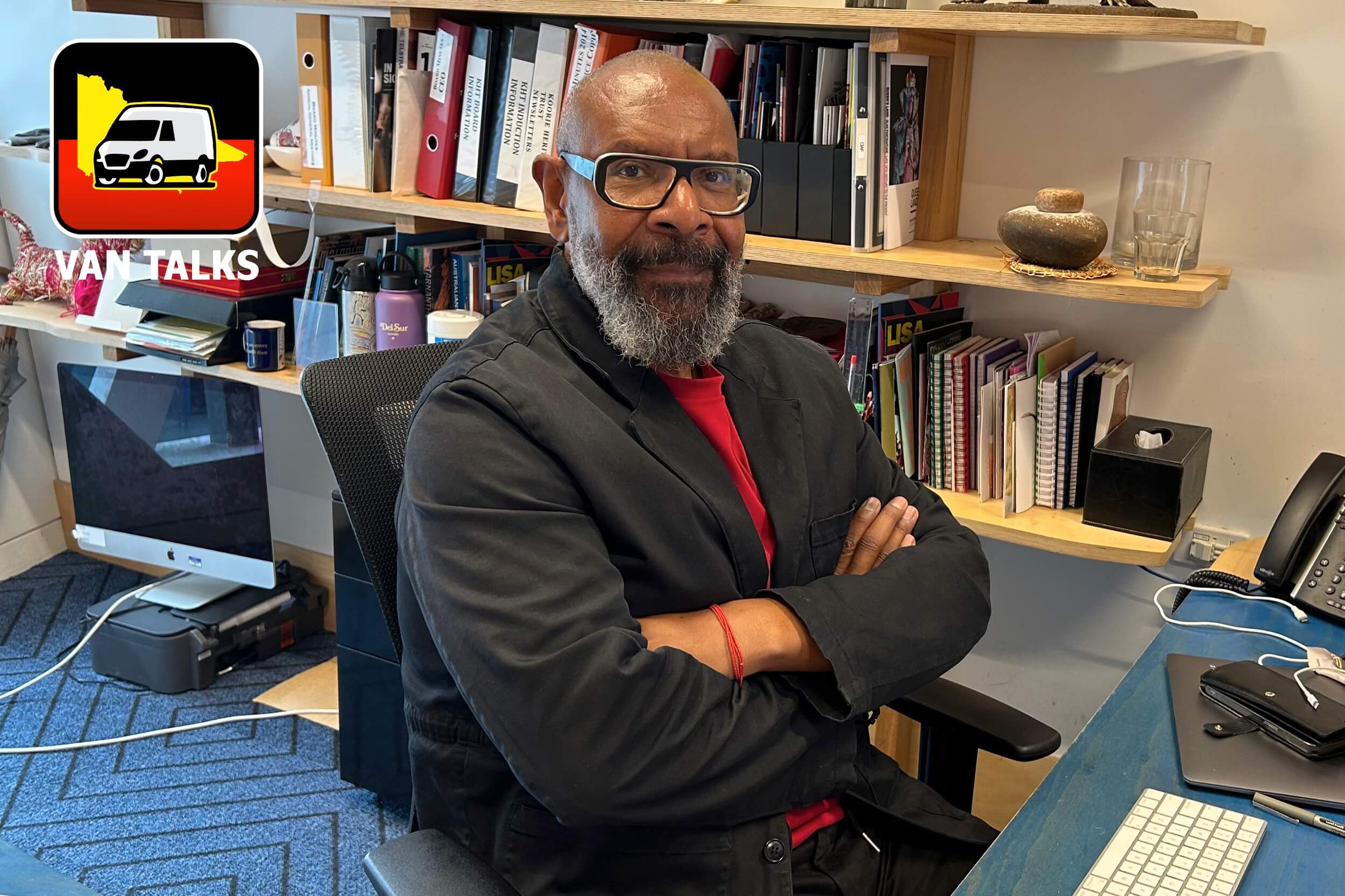
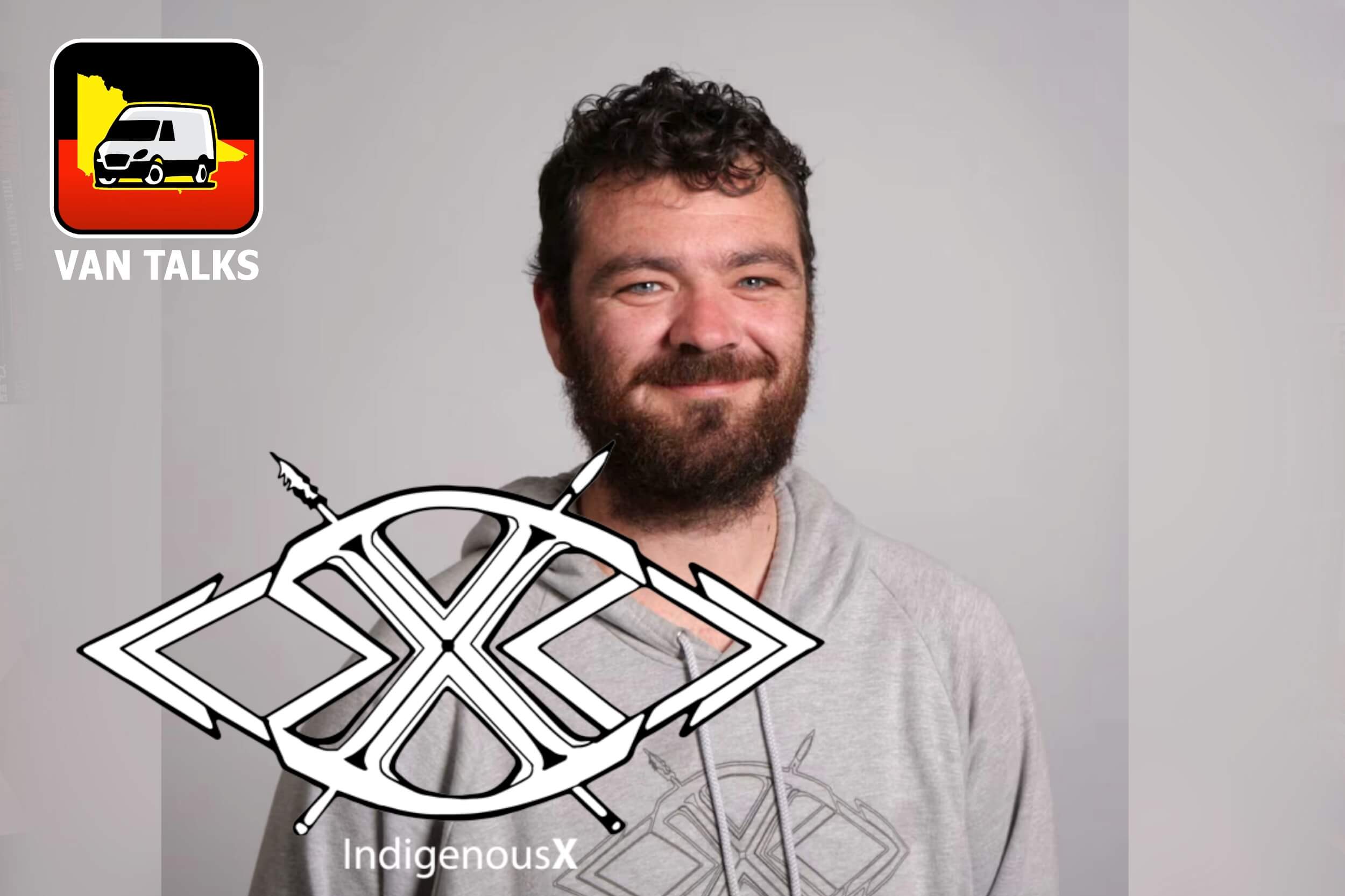
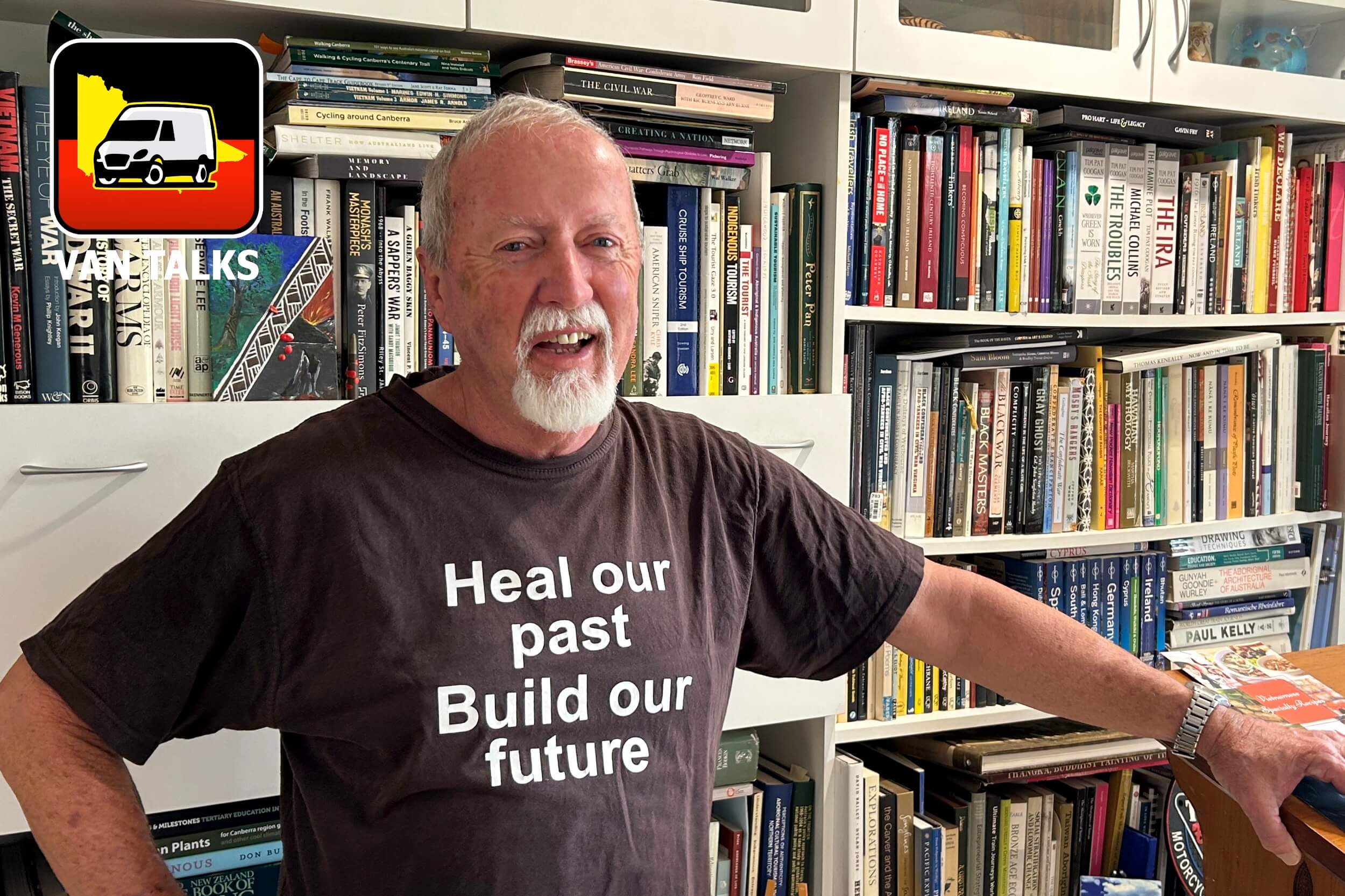
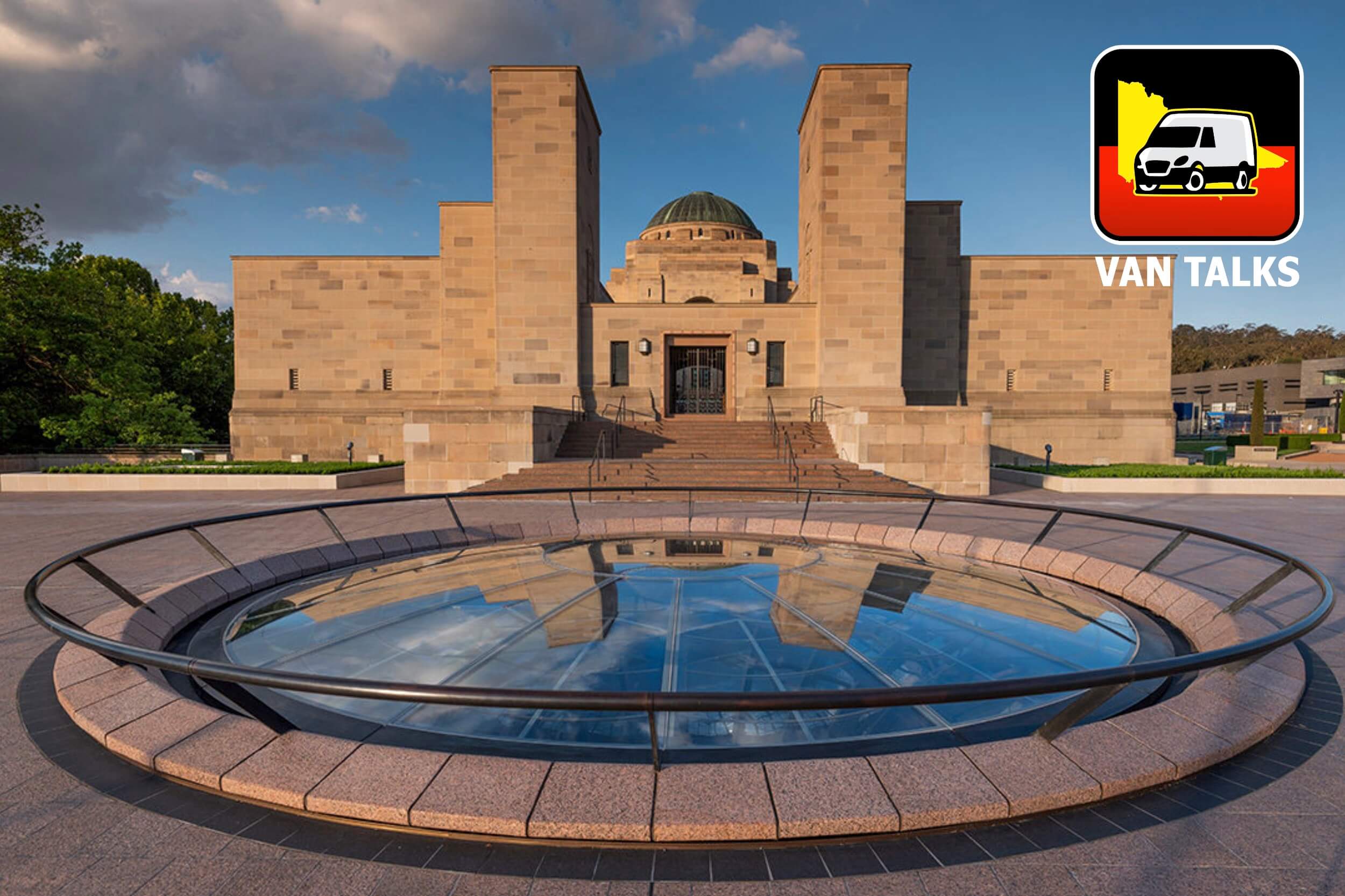

0 Comments